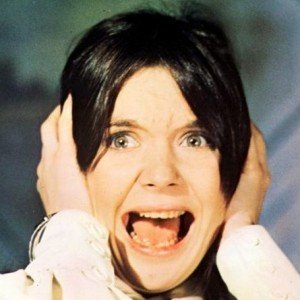THE LEGEND OF HELL HOUSE: Building A Better Haunted House
A great test of any horror filmmaker's directorial chops is the haunted house movie. Creating the illusion of "things that go bump in the night" can be done simply and cheaply - but you have to have a sense of style and a precise directorial touch to make those kinds of scares stick with the audience. The best filmmakers master these skills and also use the tricks of the directorial trade to create an unsettling atmosphere that gives the story containing those scares a real drive and sense of purpose. Having the vision to achieve 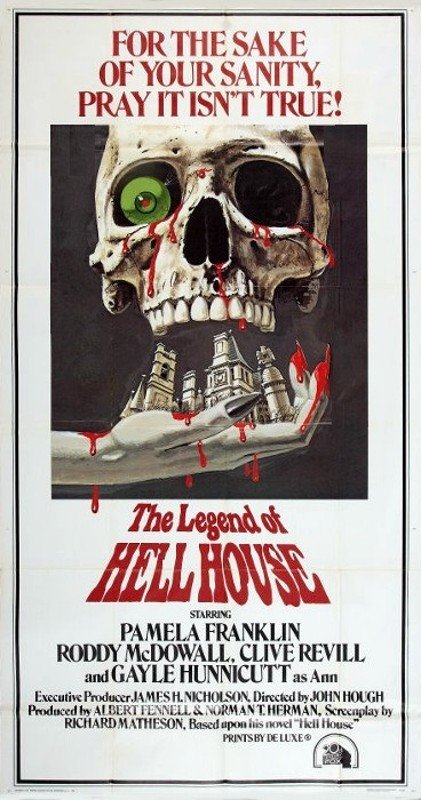 all this is what separates the experts from the hacks in this subgenre.For an example of experts at play in the haunted house subgenre, a great choice is The Legend Of Hell House. Horror and fantasy pro Richard Matheson adapted in his controversial novel Hell House in a subtler, less lurid fashion to create the script for this film, which focuses on a quartet of people entering the titular location on a dangerous mission. The leader is physicist Dr. Barrett (Clive Revell), who is being paid handsomely by a aging millionaire to prove whether or not there is an afterlife. Said manse has a long, nasty history of death and perversion that keeps most people at bay - but Barrett won't be deterred in proving the superiority of his scientific beliefs.
all this is what separates the experts from the hacks in this subgenre.For an example of experts at play in the haunted house subgenre, a great choice is The Legend Of Hell House. Horror and fantasy pro Richard Matheson adapted in his controversial novel Hell House in a subtler, less lurid fashion to create the script for this film, which focuses on a quartet of people entering the titular location on a dangerous mission. The leader is physicist Dr. Barrett (Clive Revell), who is being paid handsomely by a aging millionaire to prove whether or not there is an afterlife. Said manse has a long, nasty history of death and perversion that keeps most people at bay - but Barrett won't be deterred in proving the superiority of his scientific beliefs.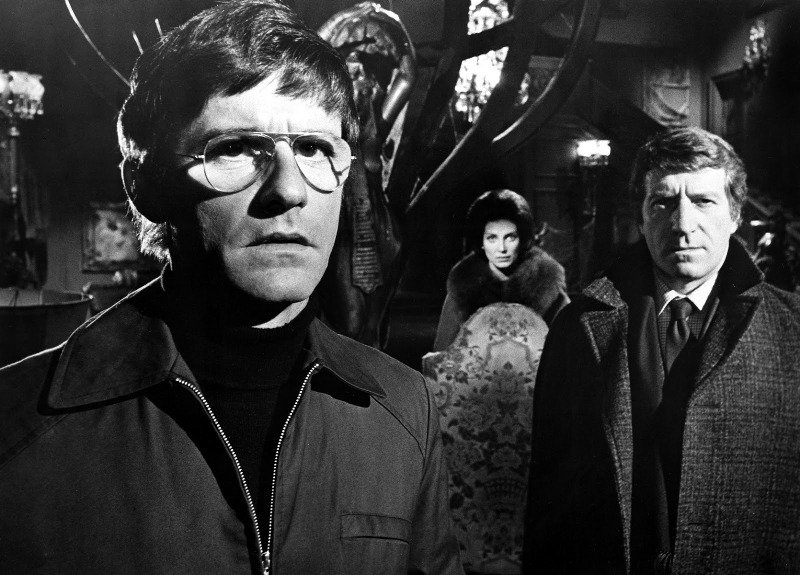 Barrett is assigned a team in the form of "mental medium" Florence (Pamela Franklin), a nubile young woman with a religious bent, and "physical medium" Fischer (Roddy McDowell), the lone survivor of a previous unsuccessful excursion into Hell House. Also accompanying the group of Barrett's wife, the devoted Ann (Gayle Hunnicutt). As Revill prepares equipment designed to prove that science can undo the energy that makes up what others consider a "haunting," a sinister spectral presence makes itself known and begins preying upon the innocence, fear and hidden desires of its inhabitants. No matter how Barrett decides to spin it, his mysterious opponent is determined to have the last word in their battle of science and the supernatural.
Barrett is assigned a team in the form of "mental medium" Florence (Pamela Franklin), a nubile young woman with a religious bent, and "physical medium" Fischer (Roddy McDowell), the lone survivor of a previous unsuccessful excursion into Hell House. Also accompanying the group of Barrett's wife, the devoted Ann (Gayle Hunnicutt). As Revill prepares equipment designed to prove that science can undo the energy that makes up what others consider a "haunting," a sinister spectral presence makes itself known and begins preying upon the innocence, fear and hidden desires of its inhabitants. No matter how Barrett decides to spin it, his mysterious opponent is determined to have the last word in their battle of science and the supernatural.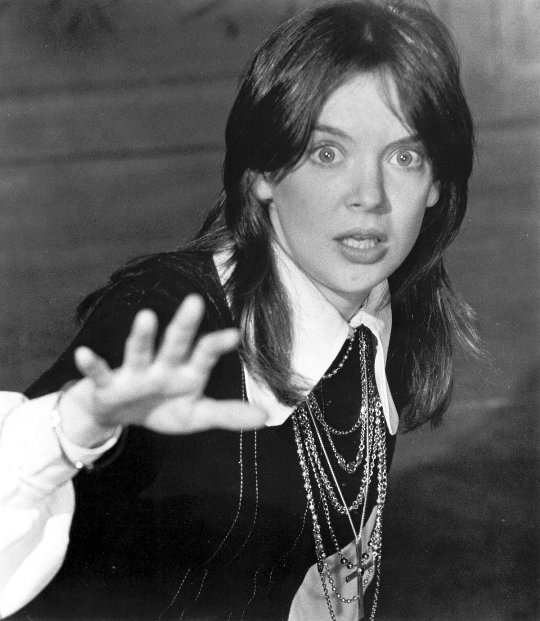 The results add up to a haunted house excursion for the record books. The script starts with a template reminscent of The Haunting - four people versus a haunted house - but quickly finds its own groove. Matheson's literate and twisty script, which boasts a clever third act, is the engine that powers this sinister machine but it's the crafty, intense direction from John Hough that gives the film its drive. Following Matheson's template, he creates a series of confrontations between characters or attacks of the house's power on the characters to build an ever-escalating sense of paranoid tension.The Legend Of Hell House is all the more impressive because Hough achieves his effects with a minimum of special effects. He gets most of his mileage out of three things. The first is Alan Hume's excellent photography, which uses shadowy lighting to set a mood and then carefully-deployed uses of ha
The results add up to a haunted house excursion for the record books. The script starts with a template reminscent of The Haunting - four people versus a haunted house - but quickly finds its own groove. Matheson's literate and twisty script, which boasts a clever third act, is the engine that powers this sinister machine but it's the crafty, intense direction from John Hough that gives the film its drive. Following Matheson's template, he creates a series of confrontations between characters or attacks of the house's power on the characters to build an ever-escalating sense of paranoid tension.The Legend Of Hell House is all the more impressive because Hough achieves his effects with a minimum of special effects. He gets most of his mileage out of three things. The first is Alan Hume's excellent photography, which uses shadowy lighting to set a mood and then carefully-deployed uses of ha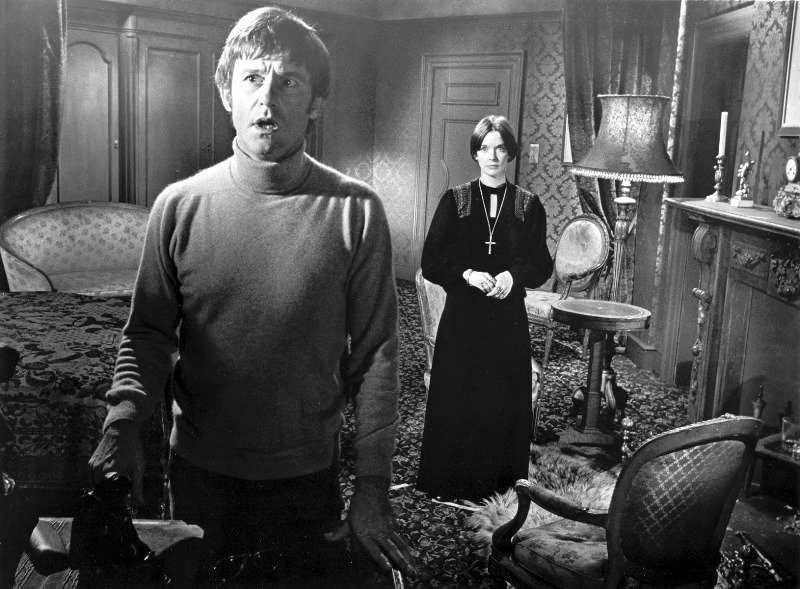 nd-held camerawork and fish-eyed lense shots for big shocks. He and Hough also make effective use of tense close-ups of the actors to accentuate the rise of tension in particular seasons. The second tool is an impressive, mostly musique concrète score from Delia Derbyshire and Brian Hodgson that effectively uses sheets of electronic white noise to amp up the unearthly quality of the supernatural sequences.However, the most important tool in Hough's arsenal on The Legend Of Hell House is a smartly chosen cast. Revill gives a quiet, carefully controlled performance as the film's man of science, withholding from the viewer and his castmates until the storyline stops allowing him to, and Hunnicutt does some quietly intense work as a faithful wife who is toyed with in a sexual fashion by the house's malicious and perverse spirit (the scenes where she comes on to Fischer are sexy and creepy all at once).
nd-held camerawork and fish-eyed lense shots for big shocks. He and Hough also make effective use of tense close-ups of the actors to accentuate the rise of tension in particular seasons. The second tool is an impressive, mostly musique concrète score from Delia Derbyshire and Brian Hodgson that effectively uses sheets of electronic white noise to amp up the unearthly quality of the supernatural sequences.However, the most important tool in Hough's arsenal on The Legend Of Hell House is a smartly chosen cast. Revill gives a quiet, carefully controlled performance as the film's man of science, withholding from the viewer and his castmates until the storyline stops allowing him to, and Hunnicutt does some quietly intense work as a faithful wife who is toyed with in a sexual fashion by the house's malicious and perverse spirit (the scenes where she comes on to Fischer are sexy and creepy all at once). 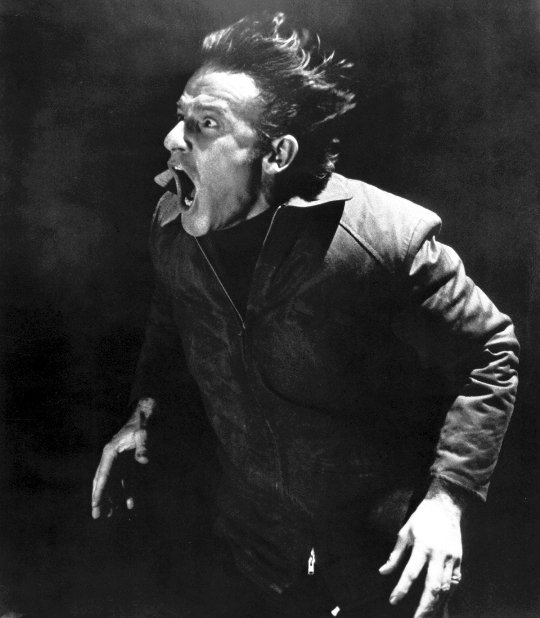 However, the big scene-stealers are Franklin, who might be the bravest of the bunch. She provides an excellent foil for Revill, arguing forcefully for her spiritual approach, and has a series of powerful scenes where she has to deal with house's cruelty alone that are beautifully acted without the benefit of another actor to bounce off of. McDowell is instantly convincing as the haunted, cynical survivor of the group. He seems at first to be a background presence but the film gradually builds up his importance, making him crucial to the third act: without getting into spoilers, there is one scene he has to carry totally on his own and McDowell delivers some of the best acting of his career.In short, The Legend Of Hell House remains a formidable shocker over forty years after the fact because it focuses squarely on craftsmanship - not only in Hough's savvy direction but also in the scripting and performances - rather than easily dated shock effects. The film's investment in tried-and-true storytelling values, cleverly orchestrated by the director, ensures that it will remain potent as long as anyone can spooked by the sinister side of life after death.
However, the big scene-stealers are Franklin, who might be the bravest of the bunch. She provides an excellent foil for Revill, arguing forcefully for her spiritual approach, and has a series of powerful scenes where she has to deal with house's cruelty alone that are beautifully acted without the benefit of another actor to bounce off of. McDowell is instantly convincing as the haunted, cynical survivor of the group. He seems at first to be a background presence but the film gradually builds up his importance, making him crucial to the third act: without getting into spoilers, there is one scene he has to carry totally on his own and McDowell delivers some of the best acting of his career.In short, The Legend Of Hell House remains a formidable shocker over forty years after the fact because it focuses squarely on craftsmanship - not only in Hough's savvy direction but also in the scripting and performances - rather than easily dated shock effects. The film's investment in tried-and-true storytelling values, cleverly orchestrated by the director, ensures that it will remain potent as long as anyone can spooked by the sinister side of life after death.


